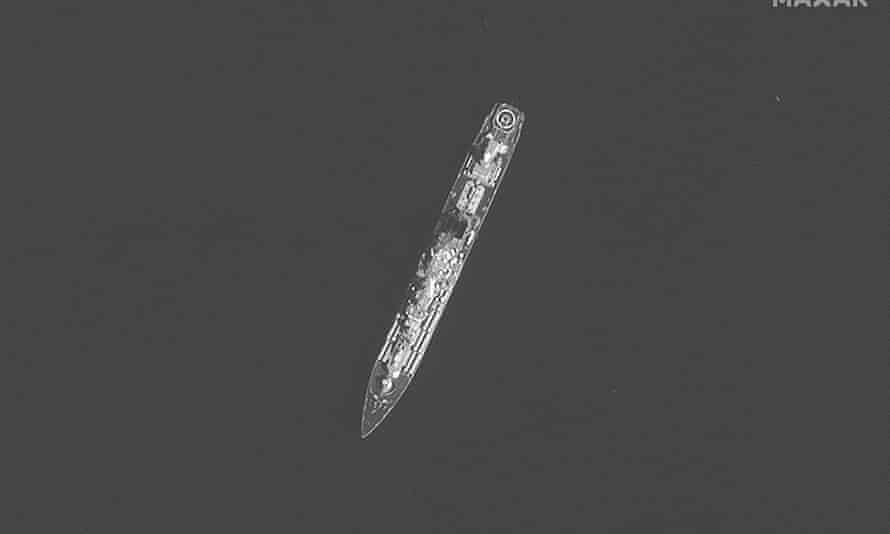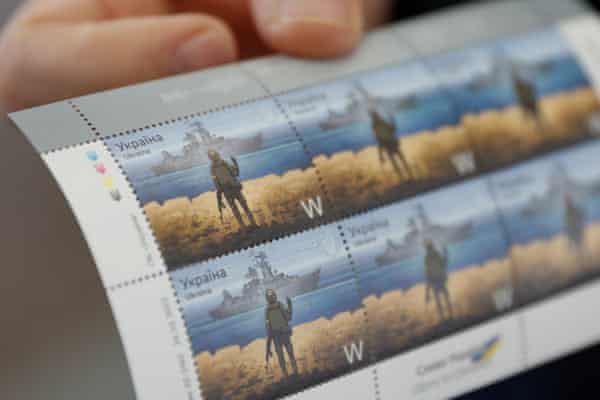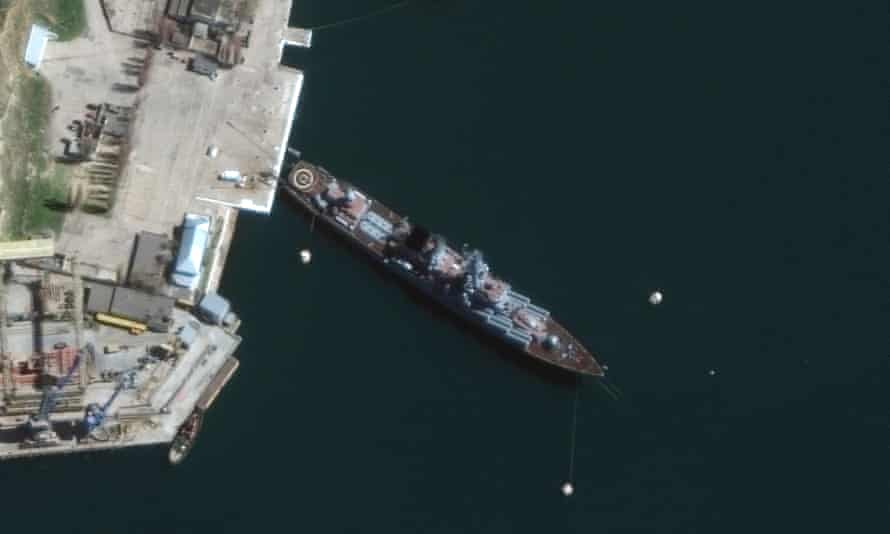Russia’s defence ministry said it was investigating what happened to its flagship cruiser Moskva after Ukraine said it had hit the vessel with an anti-ship missile, forcing its crew to abandon ship.
The ministry denied reports the warship had sunk to the bottom of the Black Sea. It said the Moskva had “retained buoyancy”, with fires extinguished and the crew transferred to another vessel.
Dmitry Peskov, Vladimir Putin’s chief spokesperson, was unable to give the cause of the explosion on the warship, saying: “I can’t tell you anything. This is a topic for the ministry of defence.”
Ukraine’s southern military command said on Thursday it struck the Moskva with a Neptune missile and that the ship had started sinking. Fire had erupted after the missile exploded, it said on Facebook.
It added that four Russian ships that went to the Moskva’s rescue were hampered by stormy weather and by ammunition blowing up onboard. Unconfirmed reports suggested the missile cruiser had turned upside down and had started to sink.
The apparent attack – 50 days after Putin launched his invasion of Ukraine – represents a symbolic blow for the Kremlin. The Moskva was the pride of Russia’s Black Sea naval fleet and the most prestigious vessel involved in the war in Ukraine.
Rumours circulating in Moscow suggested Putin had refrained from launching a beach landing and attack on the Ukrainian port of Odesa because he wanted to preserve the Moskva from danger.
Jubilant Ukrainians celebrated the ship’s apparent end on social media.

The Moskva gained notoriety early in the war when the crew demanded the surrender of Ukrainian forces on Snake Island, prompting a riposte from border guards on the island: “Fuck you, Russian warship.”
The phrase instantly became a symbol of national defiance, and is now a universal meme. It has appeared on a new national postage stamp as well as on checkpoints, shop windows, Ukrainian military vehicles and private cars.
On Wednesday Ukraine’s president, Volodymyr Zelenskiy, shared a photo of himself smiling and holding the new anti-Moskva stamp.

The Moskva, which has a crew of 510, was evacuated after ammunition caught fire, according to Russia’s Interfax news agency. It declined to say what had caused the blaze.
Commissioned in 1983, the ship was armed with 16 anti-ship Vulkan cruise missiles with a range of at least 440 miles (700km). According to reports, it also carried S-300 anti-air missiles, which are crucial to Russia’s air superiority over Crimea and Ukraine’s Kherson province, now occupied by Russian troops.
Russian state media said all the crew were safe. Citing the defence ministry, it said arrangements were being made to tow the cruiser into port. So far no pictures of the damage have emerged.
“The source of fire on the cruiser Moskva is localised. There is no open fire. Explosions of ammunition have been stopped,” the state news agency Tass quoted the defence ministry as saying.
Maksym Marchenko, the Ukrainian governor of the region around Odesa, said the Moskva had been hit by two Ukrainian-made anti-ship cruise missiles. “Neptune missiles guarding the Black Sea caused very serious damage,” he said.
“It has been confirmed that the missile cruiser Moskva today went exactly where it was sent by our border guards on Snake Island.”
Oleksiy Arestovych, a Ukrainian presidential adviser, said: “It’s burning strongly, right now. And with this stormy sea, it is unknown whether they will be able to receive help.”
In a tweet Arestovych joked that the warship had made a “negative ascent”, not far from Snake Island. He cited an interview with Putin in 2000, when Russia’s new president was asked what had happened to the Kursk submarine. Putin replied: “It sank.”
Oleksandr Turchynov, a former secretary of the national security and defence council, said Ukraine hit another Russian ship two weeks ago with a Neptune cruise missile. He said the missile inflicted “significant damage” on the Admiral Essen, “removing it from combat operation”.
The reported Moskva attack came hours after Ukraine’s allies sought to rally new support for the embattled country.

On a visit with leaders from three other countries on Russia’s doorstep that fear they could next be in Moscow’s sights, the Lithuanian president, Gitanas Nausėda, said: “The fight for Europe’s future is happening here.”
The Russian navy has launched cruise missiles into Ukraine and its activities in the Black Sea are crucial to supporting land operations in the south of the country, where it is battling to seize full control of the port of Mariupol.
Russian forces have pulled back from some northern parts of Ukraine after suffering heavy losses and failing to take the capital, Kyiv. Ukraine and its western allies say Moscow is redeploying for a new offensive in the east.
The Moskva had been leading a substantial Russian naval presence in the Black Sea, threatening Ukraine’s southern coast and its key ports. This has been one of the main focuses of the Kremlin’s military efforts, and is aimed at cutting off Ukraine’s access to sea and creating a land bridge from the Crimean peninsular to the Russian border.
The news of the flagship’s damage overshadowed Russian claims of advances in Mariupol, where they have been battling the Ukrainian army since the early days of the invasion in some of the heaviest fighting of the war – at a horrific cost to civilians.
Igor Konashenkov, the chief spokesperson of the Russian defence ministry, said on Wednesday that 1,026 troops from the Ukrainian 36th marine brigade had surrendered at a metals factory in the city.
But Vadym Denysenko, an adviser to Ukraine’s interior minister, rejected the claim, telling Current Time TV: “The battle over the seaport is still ongoing today.”
Russia and Ukraine swapped prisoners on Thursday for the fourth time. Ukraine’s deputy prime minister, Iryna Vereshchuk, said that 17 soldiers, five officers, and eight civilians were released from Russian captivity. She didn’t disclose the number of prisoners of war returned to Russia.
